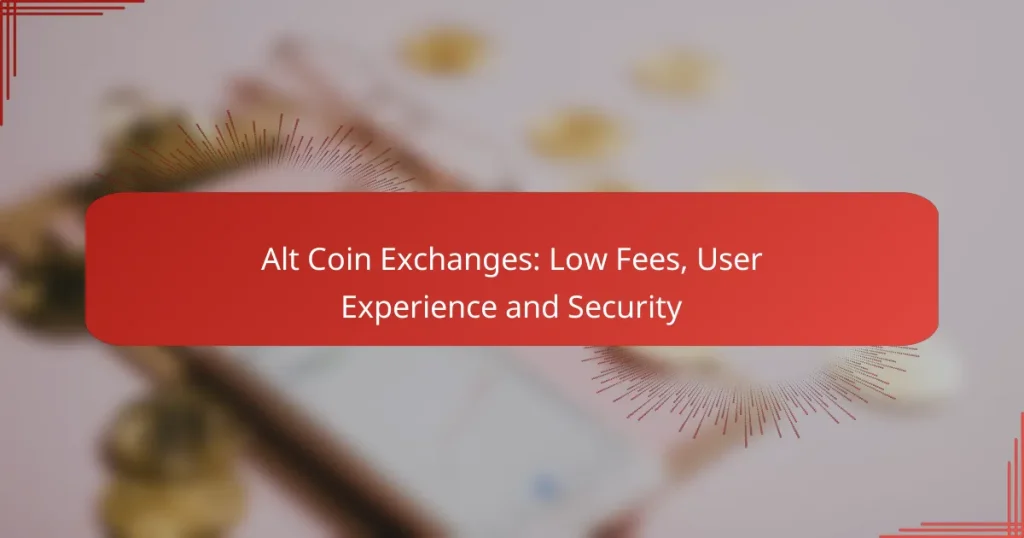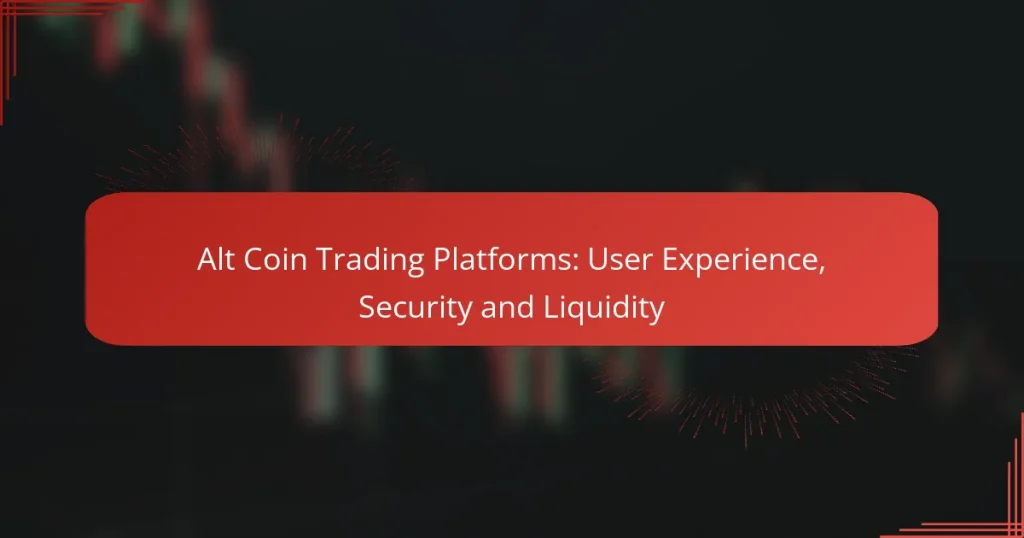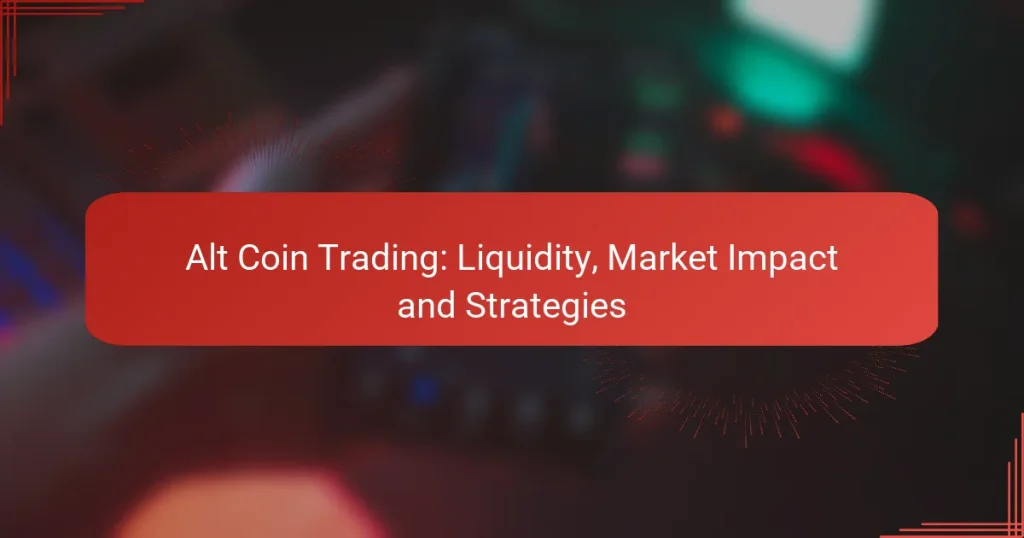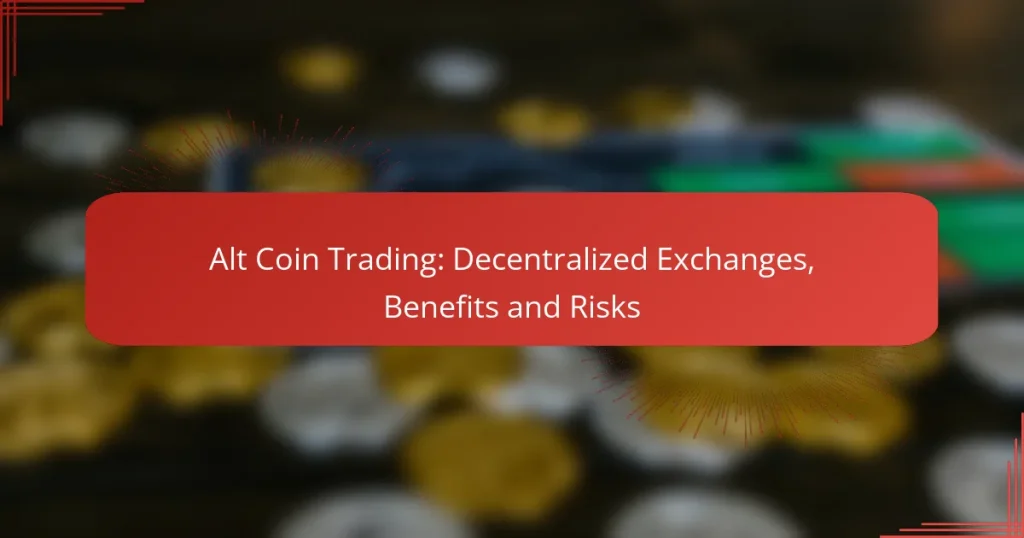Altcoin exchanges and trading platforms provide essential services for buying, selling, and trading a variety of cryptocurrencies beyond Bitcoin. With options like Binance US, Kraken, and Coinbase Pro, traders can find platforms that suit their needs in terms of security, fees, and user experience. Evaluating these factors is crucial for making informed trading decisions and optimizing your investment strategy.
Alt Coin Investments: Trading Bots, Benefits and Drawbacks
Alt Coin Trading Platforms: User Experience, Security and Liquidity
Alt Coin Trading Platforms: Selection Criteria and User Experience
Alt Coin Trading: Liquidity, Market Impact and Strategies
Alt Coin Trading: Decentralized Exchanges, Benefits and Risks
Alt Coin Exchanges: Security Features, Compliance and User Trust
Which altcoin exchanges are the best for trading in the US?
The best altcoin exchanges for trading in the US include Binance US, Kraken, Coinbase Pro, Gemini, and KuCoin. These platforms offer a variety of features, security measures, and trading options that cater to both beginners and experienced traders.
Binance US
Binance US is a popular choice due to its extensive selection of altcoins and competitive trading fees, typically around 0.1%. It provides a user-friendly interface and advanced trading options, making it suitable for both novice and experienced traders.
When using Binance US, consider enabling two-factor authentication for enhanced security. The platform also offers a mobile app for trading on the go, which can be convenient for active traders.
Kraken
Kraken is known for its strong security features and a wide range of altcoins. It offers various trading pairs and has a tiered fee structure that can be beneficial for high-volume traders, with fees ranging from 0% to 0.26% depending on trading volume.
Kraken also provides advanced trading tools and margin trading options. Users should familiarize themselves with the platform’s verification process, which can take some time but is essential for compliance with US regulations.
Coinbase Pro
Coinbase Pro is the advanced trading platform from Coinbase, offering lower fees compared to its standard version. It features a robust selection of altcoins and a professional trading interface, making it ideal for serious traders.
Users can benefit from real-time market data and advanced charting tools. It’s advisable to start with a small investment to understand the platform’s features and trading dynamics before committing larger amounts.
Gemini
Gemini is a regulated exchange known for its security and compliance with US laws. It offers a user-friendly platform with a focus on safety, making it appealing for new traders. Trading fees are generally around 0.35% for takers and 0.10% for makers.
Gemini also provides a mobile app and features like recurring buys, which can help users invest gradually. Always ensure your account is secured with strong passwords and two-factor authentication.
KuCoin
KuCoin is recognized for its vast selection of altcoins and lower trading fees, often around 0.1%. It offers unique features like staking and lending, which can enhance the trading experience.
While KuCoin is not as regulated as some US exchanges, it provides a secure environment with various security measures. Users should be cautious and conduct thorough research on the altcoins they wish to trade, as liquidity can vary significantly across different tokens.
How to choose the right altcoin trading platform?
Choosing the right altcoin trading platform involves evaluating several key factors, including security, fees, user experience, and the range of cryptocurrencies offered. A well-informed decision can enhance your trading experience and help you avoid potential pitfalls.
Security features
Security is paramount when selecting an altcoin trading platform. Look for features such as two-factor authentication (2FA), cold storage for funds, and regular security audits. Platforms that comply with regulations and have a solid reputation in the industry are generally safer options.
Additionally, check if the platform has insurance policies in place to cover potential losses from breaches. This can provide an extra layer of security for your investments.
Trading fees
Trading fees can vary significantly between platforms, impacting your overall profitability. Most exchanges charge a percentage of the trade value, which can range from low fractions of a percent to several percent, depending on the platform and the trading volume.
Consider whether the platform offers tiered fee structures that reward higher trading volumes with lower fees. Always read the fine print to understand any additional costs, such as withdrawal fees or deposit fees.
User interface
A user-friendly interface can greatly enhance your trading experience. Look for platforms that offer intuitive navigation, customizable dashboards, and easy access to trading tools. A clean design can help you make quicker decisions during trading.
Many platforms also provide mobile applications, allowing you to trade on the go. Test the platform with a demo account if available, to ensure it meets your needs before committing real funds.
Available cryptocurrencies
The range of available cryptocurrencies is a crucial factor in choosing an altcoin trading platform. Some platforms focus on a wide variety of altcoins, while others may only support major cryptocurrencies like Bitcoin and Ethereum.
Check the platform’s listing for the specific altcoins you are interested in trading. Platforms that frequently update their offerings to include new and trending cryptocurrencies can provide more opportunities for investment.
What are the fees associated with altcoin exchanges?
Fees for altcoin exchanges can vary significantly based on the platform and the type of transaction. Understanding these fees is essential for maximizing your trading profits and minimizing costs.
Trading fees
Trading fees are charged each time you buy or sell an altcoin on an exchange. These fees typically range from 0.1% to 1% of the transaction amount, depending on the platform and your trading volume. Some exchanges offer tiered fee structures, where higher trading volumes can lead to lower fees.
It’s important to compare trading fees across different platforms before committing to one. Look for exchanges that provide competitive rates and consider any additional incentives, such as fee discounts for using the platform’s native token.
Withdrawal fees
Withdrawal fees apply when you transfer your altcoins from the exchange to an external wallet. These fees can vary widely, often ranging from a few dollars to several tens of dollars, depending on the cryptocurrency and the exchange’s policies. Some exchanges may charge a flat fee, while others may charge a percentage of the withdrawal amount.
Before withdrawing, check the fee structure of your chosen exchange to avoid unexpected costs. If you plan to withdraw frequently, consider using exchanges with lower withdrawal fees or those that offer free withdrawals under certain conditions.
Deposit fees
Deposit fees are charged when you add funds to your exchange account. Many exchanges do not charge fees for deposits made via bank transfer or cryptocurrency, while credit card deposits may incur fees ranging from 2% to 5%. Always verify the deposit methods available and their associated costs.
To minimize deposit fees, consider using bank transfers or cryptocurrencies instead of credit cards. Additionally, some exchanges may offer promotions that waive deposit fees for new users, so keep an eye out for these opportunities.
What are the risks of trading altcoins?
Trading altcoins involves several risks that can significantly impact your investment. Key risks include market volatility, regulatory uncertainties, and security vulnerabilities, all of which require careful consideration before engaging in trading activities.
Market volatility
Altcoins are known for their extreme price fluctuations, which can be influenced by market sentiment, news, and technological developments. Prices can swing dramatically within short time frames, leading to potential gains or significant losses.
For example, an altcoin may rise by over 50% in a single day, only to drop by a similar percentage the next. Traders should be prepared for this volatility and consider setting stop-loss orders to mitigate potential losses.
Regulatory risks
The regulatory landscape for altcoins is constantly evolving, with different countries implementing varying degrees of oversight. Changes in regulations can impact the legality and trading of specific altcoins, creating uncertainty for investors.
For instance, a country may suddenly classify a previously traded altcoin as a security, leading to its delisting from exchanges. Staying informed about local regulations and potential changes is crucial for anyone trading altcoins.
Security risks
Security is a major concern in the altcoin market, as exchanges and wallets can be vulnerable to hacking and fraud. Traders should be cautious about where they store their assets and consider using hardware wallets for enhanced security.
Additionally, it’s important to choose reputable exchanges with strong security measures in place. Regularly updating passwords and enabling two-factor authentication can further protect your investments from unauthorized access.
What features should I look for in an altcoin exchange?
When selecting an altcoin exchange, prioritize features such as security, user interface, fees, and the variety of cryptocurrencies offered. A reliable platform should provide a seamless trading experience while ensuring your assets are protected.
Liquidity
Liquidity refers to how easily an asset can be bought or sold without significantly affecting its price. High liquidity in an altcoin exchange means that there are enough buyers and sellers at any given time, allowing for smoother transactions.
Consider exchanges that have a large user base and high trading volumes, as these factors typically enhance liquidity. For instance, major exchanges often have liquidity levels that allow trades to be executed within seconds, while smaller platforms may experience delays.
To assess liquidity, look for trading pairs with tight bid-ask spreads and high daily trading volumes. Avoid exchanges where the spread is wide, as this can indicate lower liquidity and potentially higher costs for your trades.






